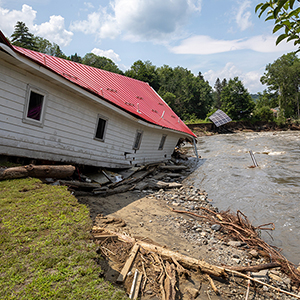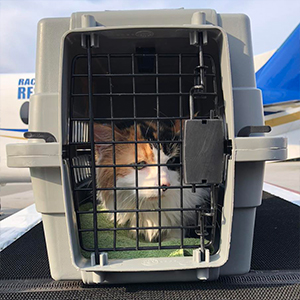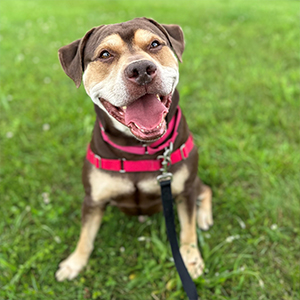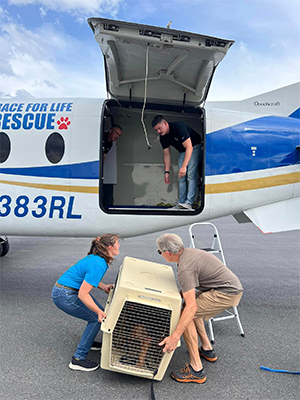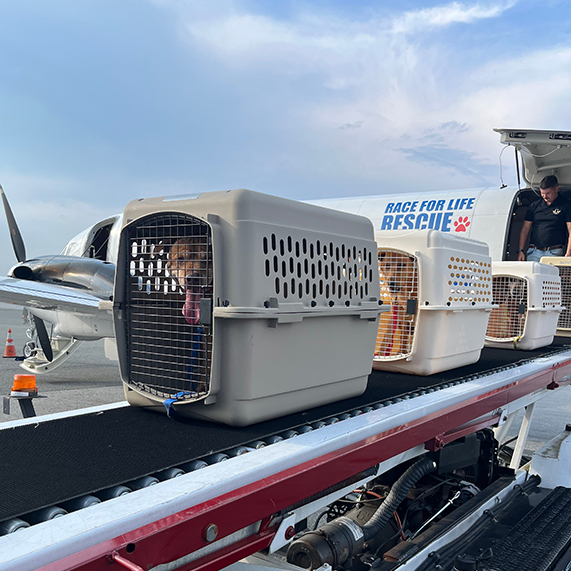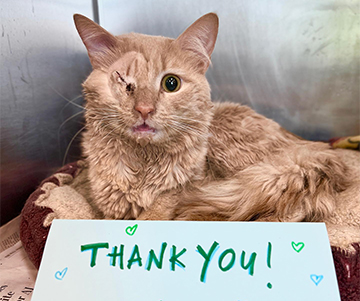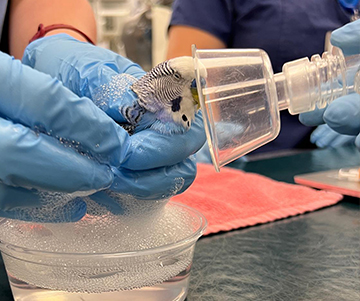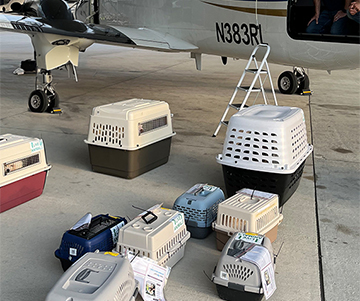On July 10, 2023, the city of Montpelier, Vermont issued a statement to its residents: be prepared for unprecedented flooding. According to the National Weather Service, more than seven inches of rain were expected to fall in some areas. In preparation for the predicted flash flooding, the governor declared a state of emergency.
Bissell Pet Foundation Animal Incident Management program, which focuses on disaster preparedness and response, contacted the Central Vermont Humane Society (CVHS) after hearing of the impending flood. The shelter staff seemed to have everything under control — at the time, everything was fine. But when the flooding reached crisis levels, state officials issued an emergency health order.
Colleen Evans, Director of Operations at the MSPCA-Angell: Cape Cod, explained that CVHS contacted them the next day. Aside from the rising waters threatening the animals in the shelter, flood victims forced from their homes kept calling to surrender their pets — and there was no room to spare at the Vermont shelter.
From Floods To Flight
The challenge: CVHS had to move its current shelter animals to accommodate the animals surrendered by flood victims. The plan: leverage the whole team and the transport experience of the MSPCA-Angell: Northeast Animal Shelter (NEAS) to help.
When things worsened in Vermont, Bissell flew a plane to Connecticut to be on standby. As soon as CVHS alerted them, things moved quickly. “We planned the whole thing in 12 hours,” said Mike Keiley, MSPCA-Angell Director of Adoption Centers and Programs. After CVHS confirmed they could get to the Edward F. Knapp State Airport nearby, the staff loaded the animals into the plane, and it made the trip south to Hanscom Field Airport in Bedford, MA, the MSPCA-Angell’s preferred airport for animal transports.
While Evans worked with the team of volunteer coordinators, Keiley checked in with the Massachusetts Department of Agricultural Resources to see if they could grant an exemption to the requirement of Official Certificates of Veterinary Inspection (OCVIs) that are usually mandatory to accept out-of-state animals. (The USDA certified veterinarians that were needed to do the OCVIs could not physically get to the shelter due to the flooding.) Luckily, the state approved the exemption, provided the MSPCA-Angell completed health certificates before the Vermont shelter animals left the Massachusetts-required 48-hour isolation.
On July 12, the CVHS animals arrived in Massachusetts. Volunteers and staff drove to Bedford, picked them up, and distributed them among the MSPCA-Angell shelters. There were nine dogs, ten cats, and one chinchilla. Three dogs headed to the shelter on Cape Cod, four went to Nevins Farm, and the Boston shelter welcomed two dogs and the chinchilla. The ten cats were brought to NEAS. (And animals weren’t the only thing transported: MSPCA-Angell staff used a horse trailer from Nevins Farm to haul two large pallets of pet food to the Vermont Foodbank as they were out of pet food.)
Evans said the animals transported that afternoon were already in the CVHS shelter before the flooding began. “Some animals stayed behind because flying wasn’t an option because of their size, or there was the worry of additional emotional distress,” she added.
While the transport was mostly smooth, there were some hiccups. MSPCA-Angell volunteers encountered medical challenges with some animals; one kitten had a heart murmur that needed to be evaluated by a cardiologist. Some of the animals needed more time to adjust before being made available for adoption due to the stress of transport and shifting suddenly to a new shelter environment. According to Evans, one of the biggest challenges was the last-minute transportation coordination.
"It’s a long drive to Cape Cod," Evans said. “Nevertheless, everyone got involved. Sarah Messeck, our Program Coordinator, drove up from the Cape and brought back some animals.” But Evans added that because they’ve all done rescues and transports like this one frequently, she knew the transport would succeed with teamwork.
The Vital Role of Donors
Support from donors ensures the MSPCA-Angell remains a leader in providing state-of-the-art veterinary care and necessary resources for transports like these for flood victims.
“This life-saving work would not be possible without support from our donors,” said Evans. She added that support can be provided in many ways — from donations of linens, paper towels, hot dogs, and cheese — even volunteers who drive from Bedford to Cape Cod. “Physical donations help rescue situations like this because the shelter’s population increases unexpectedly, then that affects the rest of the organization’s general operations.”
There When Emergencies Happen
While the flood waters in Montpelier have receded, their devastation is long-lasting. As of this printing, it was thought that, if needed, the MSPCA-Angell would take in more animals — despite its shelters being at 90 percent capacity. “Our team is there when emergencies happen,” Evans said.
Keiley agreed. “There are a million good reasons we could have politely declined that first request to transport and house the CVHS animals. Our shelters are already close to capacity with animals, and we are short-staffed,” he said. “However, our team always wants to help with natural disasters and large seizure cases, so we were ready to lend a hand.”
